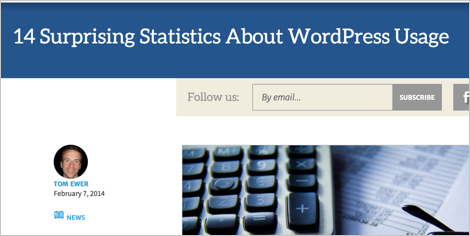Why didn't WordPress take off with tech docs?
The popularity of WordPress
Despite the popularity of WordPress as detailed in 14 Surprising Statistics About WordPress Usage, this web CMS still hasn’t emerged as a competing help authoring tool in the tech comm industry.
Here are some of the staggering statistics about WordPress usage mentioned in the article:
- 48% of Technorati’s Top 100 Blogs Are Managed With WordPress
- 74.6 Million Sites Depend on WordPress
- WordPress-Related Keywords Score 37 Million Searches Per Month
- 40 Translations of WordPress
- 22% of New U.S. Registered Domains Run on WordPress
- WordPress.com Gets More Unique Visitors Than Amazon (Us)
- WordPress.com Employs Only 229 People
- 6 New WordPress.com Posts Every Second
- WordPress Developers Charge $50/hr
- 29,000 WordPress Plugins and Growing Daily
- 98 Versions of WordPress to Date
- 46 Million Downloads of WordPress.org
- WordPress Is Most Popular With Business Websites
- Akismet Is the Most Popular Plugin
With a portfolio of stats like that, you’d think that WordPress would be a common CMS used in tech comm departments as well. But as far as I can tell, WordPress is rarely used by technical writers. Why?
Challenges in using WordPress for tech docs
Here are a few reasons:
- WordPress is a lightweight web CMS, not a CCMS (component content management system). As such, it isn’t optimized for chunking different components and reusing those chunks in different outputs. The latter is much more common in tech doc departments.
- WordPress isn’t meant for publishing multiple outputs of content, such as three different versions of documentation for several different audiences, or for publishing PDF, HTML, and mobile outputs. With WordPress, you have just one output: HTML.
- WordPress requires a heavy infrastructure that consists of Linux, Apache, MySQL, and PHP (LAMP). Setting up this infrastructure and fine-tuning it for WordPress can require more application-system-engineering knowledge than most technical writers have or want to get into. Additionally, if you have 10 different doc sites, you would need 10 different instances of the infrastructure. Alternatively, you could run WordPress Multisite, but then you have more robust platform management tasks and challenges.
- WordPress usually doesn’t meet enterprise security requirements. WordPress sites get routinely hacked and are noted by enterprise security groups for their poor security. As such, if using a web CMS, much of the time a more robust platform like Drupal will be selected.
- WordPress isn’t ideal for updating documentation content. WordPress is really intended for one-off articles published as blog posts, articles, or other web content that you publish once and then rarely update. With tech comm docs, however, you’re constantly updating existing content with each new release, re-working and editing and cross-referencing the content to align with the changing shape of the product. When you have to find and update all of the pages in WordPress like this, it can be a pain.
Despite these shortcomings, I still think WordPress wouldn’t be a poor choice for publishing tech docs. The many themes, plugins, and web hosts that specialize in WordPress make this a more accessible and functional platform than other web-based CMSs. But so far this hasn’t been the case. What do you think? Why is WordPress such a common platform for web publishing but uncommon for tech docs?
About Tom Johnson

I'm an API technical writer based in the Seattle area. On this blog, I write about topics related to technical writing and communication — such as software documentation, API documentation, AI, information architecture, content strategy, writing processes, plain language, tech comm careers, and more. Check out my API documentation course if you're looking for more info about documenting APIs. Or see my posts on AI and AI course section for more on the latest in AI and tech comm.
If you're a technical writer and want to keep on top of the latest trends in the tech comm, be sure to subscribe to email updates below. You can also learn more about me or contact me. Finally, note that the opinions I express on my blog are my own points of view, not that of my employer.


